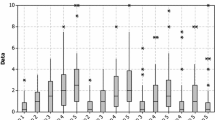Abstract
The “gambler's fallacy” is the belief that the probability of an event is decreased when the event has occurred recently, even though the probability is objectively known to be independent across trials. Clotfelter and Cook (1991, 1993) find evidence of the gambler's fallacy in analysis of data from the Maryland lottery's“Pick 3” numbers game. In the Maryland lottery, the payout to all numbers is equal at $250 on a winning fifty-cent bet, so the gambler's fallacy betting strategy costs bettors nothing. This article looks at the importance of the gambler's fallacy in the New Jersey lottery's three-digit numbers game, a pari-mutuel game where a lower amount of total wagering on a number increases the payout to that number. Results indicate that the gambler's fallacy exists among bettors in New Jersey, although to a lesser extent than among those in Maryland.
Similar content being viewed by others
References
Clotfelter, Charles, and P. J. Cook. (1989).Selling Hope: State Lotteries in America. Cambridge: Harvard University Press.
Clotfelter, Charles, and P. J. Cook. (1991). “Lotteries in the Real World,”Journal of Risk and Uncertainty 4, 227–232.
Clotfelter, Charles, and P. J. Cook. (1993). “The ‘Gambler's Fallacy’ in Lottery Play,”Management Science.
Harrison, Glenn W. (1989). “Theory and Misbehavior of First Price Auctions,”American Economic Review 79, 749–62.
Morrisey, Rebecca S., and Peter C. Ordoshook. (1975). “Rational Choice, Light Guessing, and the Gambler's Fallacy,”Public Choice 22, 79–89.
Tversky, Amos, and Daniel Kahneman. (1974). “Judgement under Uncertainty: Heuristics and Biases,”Science 185, 1124–1131.
Author information
Authors and Affiliations
Rights and permissions
About this article
Cite this article
Terrell, D. A test of the gambler's fallacy: Evidence from pari-mutuel games. J Risk Uncertainty 8, 309–317 (1994). https://doi.org/10.1007/BF01064047
Issue Date:
DOI: https://doi.org/10.1007/BF01064047




